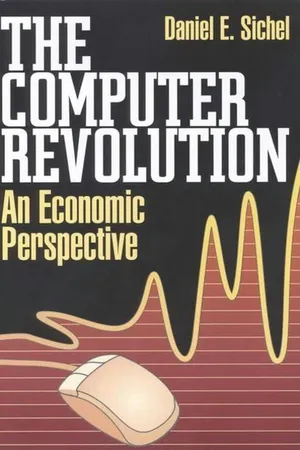
- English
- ePUB (mobile friendly)
- Available on iOS & Android
eBook - ePub
About this book
During the 1980s and into this decade, U.S. businesses poured billions of dollars into computers and other information technology. Yet the productivity performance of the U.S. economy in the 1980s remained lackluster--especially in the service sector--leading many observers to suspect that companies were not getting their money's worth from these high-tech investments. At the same time, academic research found little evidence of a productivity payoff. But have the tables now turned? With an apparent improvement in productivity in recent years, much academic and popular opinion now suggests that the payback is at hand or just around the corner.
As the nation embarks on a major effort to develop an Information Superhighway, it is critical for policymakers, opinion leaders, and others to understand the contribution and role of information technology in the economy during recent decades. This book provides a straightforward guide to the economic issues underlying the debates about these issues, using quantitative and historical analysis, supplemented with interviews of small and large service-sector companies.
To set the stage, Daniel Sichel reviews the debates over the role of computers and summarizes the essential facts about computer use, with a particular emphasis on software. Going beyond basic facts, Sichel describes an economic framework for assessing the aggregate economic impact of computers in recent decades and for looking ahead at this impact in the future. Quantitative estimates from this framework, along with supporting historical and interview evidence, place limits on the contribution of computers to the overall economy. When compared to the size of the slowdown in productivity growth in the early 1970s, the overall impact of computers appears relatively modest, in part because the share of computers in the nation's capital stock is surprisingly small. Looking ahead, Sichel also raises questions as to whether computers are likely to solve the nation's productivity woes in the future.
As the nation embarks on a major effort to develop an Information Superhighway, it is critical for policymakers, opinion leaders, and others to understand the contribution and role of information technology in the economy during recent decades. This book provides a straightforward guide to the economic issues underlying the debates about these issues, using quantitative and historical analysis, supplemented with interviews of small and large service-sector companies.
To set the stage, Daniel Sichel reviews the debates over the role of computers and summarizes the essential facts about computer use, with a particular emphasis on software. Going beyond basic facts, Sichel describes an economic framework for assessing the aggregate economic impact of computers in recent decades and for looking ahead at this impact in the future. Quantitative estimates from this framework, along with supporting historical and interview evidence, place limits on the contribution of computers to the overall economy. When compared to the size of the slowdown in productivity growth in the early 1970s, the overall impact of computers appears relatively modest, in part because the share of computers in the nation's capital stock is surprisingly small. Looking ahead, Sichel also raises questions as to whether computers are likely to solve the nation's productivity woes in the future.
Frequently asked questions
Yes, you can cancel anytime from the Subscription tab in your account settings on the Perlego website. Your subscription will stay active until the end of your current billing period. Learn how to cancel your subscription.
No, books cannot be downloaded as external files, such as PDFs, for use outside of Perlego. However, you can download books within the Perlego app for offline reading on mobile or tablet. Learn more here.
Perlego offers two plans: Essential and Complete
- Essential is ideal for learners and professionals who enjoy exploring a wide range of subjects. Access the Essential Library with 800,000+ trusted titles and best-sellers across business, personal growth, and the humanities. Includes unlimited reading time and Standard Read Aloud voice.
- Complete: Perfect for advanced learners and researchers needing full, unrestricted access. Unlock 1.4M+ books across hundreds of subjects, including academic and specialized titles. The Complete Plan also includes advanced features like Premium Read Aloud and Research Assistant.
We are an online textbook subscription service, where you can get access to an entire online library for less than the price of a single book per month. With over 1 million books across 1000+ topics, we’ve got you covered! Learn more here.
Look out for the read-aloud symbol on your next book to see if you can listen to it. The read-aloud tool reads text aloud for you, highlighting the text as it is being read. You can pause it, speed it up and slow it down. Learn more here.
Yes! You can use the Perlego app on both iOS or Android devices to read anytime, anywhere — even offline. Perfect for commutes or when you’re on the go.
Please note we cannot support devices running on iOS 13 and Android 7 or earlier. Learn more about using the app.
Please note we cannot support devices running on iOS 13 and Android 7 or earlier. Learn more about using the app.
Yes, you can access The Computer Revolution by Daniel E. Sichel in PDF and/or ePUB format, as well as other popular books in Computer Science & IT Industry. We have over one million books available in our catalogue for you to explore.
Information
Table of contents
- 1. Introduction
- 2. The Economics of the Computer Revolution
- 3. Computer Hardware and Software in the Economy
- 4. Measuring the Aggregate Impact of Computers
- 5. The Computer Revolution: Examples from the Past
- Appendix: The Focused Interviews
- References